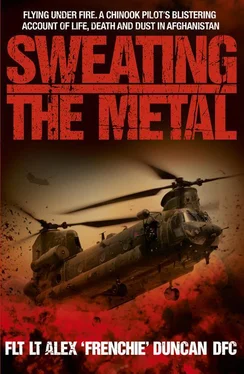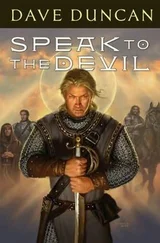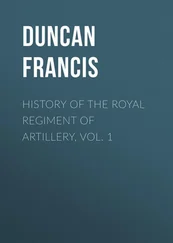I don’t know how we escape, but we do. It shouldn’t be possible. All that fire, a sky full of lead and explosives, and not one round shares the same space and time as us at any stage. Nothing hits the cab.
We’re not going back to Bastion though; not yet. We have another mission to fly as a four-ship, extracting some other British soldiers from a grid in the desert. As dust landings go, it’s horrible – one of the worst I’ve experienced before or since. A complete dustbowl full of aerials, tents, troops, without any visual references at all, so having faced a barrage of fire, we have to keep our nerve and execute perfect landings.
There’s nowhere to overshoot; JP’s to the left of me, Hannah in front and Rich to the right, so it’s all about making sure I don’t fly into them or straight down into the ground. It’s right first time or death and destruction; no pressure then! You might think, ‘Yeah, so what? You’re helicopter pilots; it’s what you do,’ but there’s difficult and then there’s nigh-on impossible, and you don’t get to cry off the really hard ones. This is real life, not a PS3 game – we’re playing without extra lives and we only get one chance.
Still, I nailed it. As difficult as my landing may have been though, it couldn’t have been harder than Stu’s, as he had to contend with my dust too. Yet he executed a perfect ‘controlled crash’ and landed exactly in the right position next to me. It’s called a controlled crash when you lose all your references at 20ft and rely on your technique and trimming of the aircraft. And that’s exactly what he did. There aren’t many others who would have got that aircraft in. We quickly got the troops on and lifted off.
Then JP calls me on the radio. A point about JP – he never does that. Ever.
‘Black Cat Two Two, Black Cat Two Three, are you ok?’
I look at Alex and he says, ‘What the fuck?’
‘He must be shit-scared for us. It’s not like him at all.’
‘Yeah, Black Cat Two Three, shaken not stirred!’ I reply, and with that we begin the forty-minute transit back to Bastion.
Now’s the time the banter starts. It’s one of our ways of reconnecting with reality. It’s usually intensely personal stuff, which is cool because we all know each other, but predictably I’m an easy target because of my French heritage. The guys have had a field day since we got shot down.
‘I’m surprised they managed to hit the world’s only fighting Frenchman.’
‘What’s the difference between a Frenchman and a piece of toast? You can make soldiers out of a piece of toast…’
The feeling when we land on at Bastion and shut the aircraft down is electric. I feel so alive! We all do a walk-around to inspect the cabs on landing, see if we’d picked up any holes. It’s amazing – you come through a shitstorm like that with so much lead flying around, and you can’t conceive that you haven’t taken some rounds – it’s like walking through a rainstorm without getting wet. But that’s exactly what all of us did. What are the chances?
We walk back to the line to sign the aircraft over to the engineers the same way we walked out, four captains. All four of us walking in and looking at each other and we’re all but speechless. I mean, what can you say, really? Words somehow don’t seem enough; you don’t know how to articulate it. I think all of us are surfing a wave of elation; we’re hyped up with all sorts of emotions still surging through our bodies and none of us can stop smiling. It’s the strangest feeling. We embrace in a huge group hug in the hangar and, finally, I’m spent – utterly done in. I think the adrenaline has worn off. It’s a funny hormone that one – when it runs out, it’s like it’s replaced with an all-consuming fatigue. I’m empty.
The sun’s coming up as we go into the JOC to report and deliver an unprecedented four accounts of coming under fire. Strange… tired as I am, I can’t imagine sleeping.
I mull over the past few days and I am convinced there’s nothing I or anyone else did that any of us wouldn’t have done again. We just did what we had to do, and then got on with the next mission. A lot is said and written about courage, but I’m still not sure what it is. I’ve heard it described like a bank balance – that each of us has a finite store to dip into before it runs out – but I don’t think it’s like that. I think it’s sanity that runs out. Courage is either there or it’s not, but it’s stock doesn’t run down if you have it. Too much combat, on the other hand, will drive you insane.
A police officer friend of mine memorably described police work as nine hours of boredom interspersed with ten minutes of adrenaline. What lifts it above the mundane and leaves you drained at the end of every shift is that you never know when those ten minutes are going to come, so you’re permanently on edge, ready to react.
My numerous Dets in theatre have shown me that being a Chinook pilot isn’t that different – it’s 95% boredom and 5% fear, except you don’t know when that 5% is going to swamp you. The only thing I knew for sure by this point was that I’d had more than my share of adrenaline and kinetic ops.
Obviously at this stage of any Det it gets harder to keep your eye on the ball, but you can’t slacken off simply because you’ll be going home soon – that’s the quickest way to die. Tiredness becomes your constant companion simply because of the tempo of ops and the shortage of cabs and crew in theatre, but there’s nothing you can do about that except man up and get on with it.
Even though the sun was up long before we got to bed after Oqab Sturga, we were back out on ops and airborne by 15:00 the following day, flying Des Browne, the then Secretary of State with dual responsibilities for Scotland and Defence. As has been widely reported, Gordon Brown was never popular with the military, given his bizarre decision to make the Cabinet post of defence part-time. The fact that we were committed in both Afghanistan and Iraq at that time made it all the more inexplicable.
We were flying mail and supplies around theatre; at one point the crewmen had Des Browne helping to unload the mail, which we joked was about the only good thing he ever did while in office. We dropped him off at Gereshk and then returned later to pick him up and bring him back to Bastion. Now, some people might have considered just landing in the Green Zone and going: ‘Okay Mr Browne, we’ve arrived at Bastion. Best of luck. Bye!’ then putting the ramp up and flying away. Me? I couldn’t possibly comment.
Later that evening we were on the IRT again. We were scrambled to FOB Inkerman to collect a T2 – a British soldier had taken a round through his leg. The flying was an absolute nightmare; it was red illume, as dark as a witch’s tit over Helmand, and it took me forever to get down because I couldn’t see the ground and we had no horizon, even through the NVGs.
We started our descent from 3,500ft, over an area hemmed in by three mountains, so there was no way I was going to rocket down like I normally would. All I could rely on was a map and our GPS, so I was hoping that both my map-reading skills and GPS were accurate! I could only muster the courage to descend at 250–500ft per minute in the total blackness. You do the maths, but it felt ten times longer knowing the mountains were there, with us in the middle of them, and no way of seeing where we were in relation. Far away, the lights of the town and the fires in the desert merged with the stars so we didn’t know which way was up and which way was down.
Читать дальше













